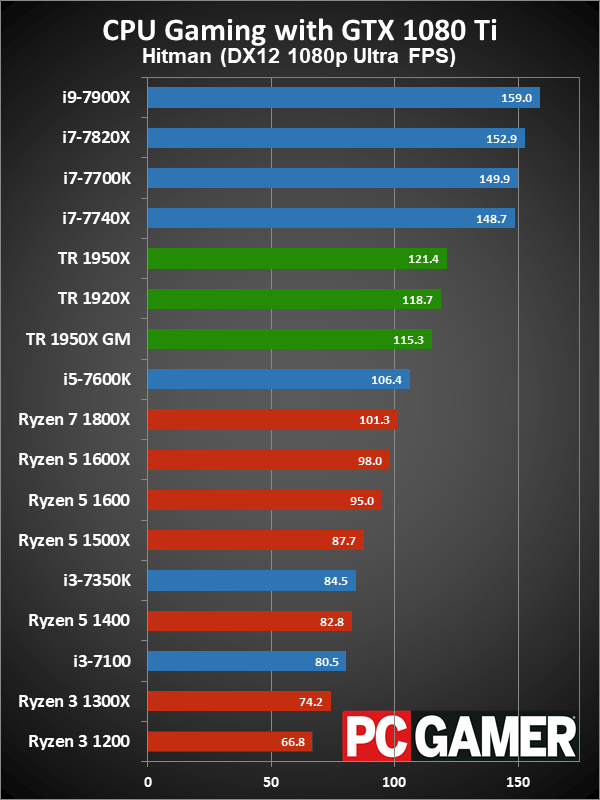goldstone77 :
juanrga :
goldstone77 :
We know that the 1700 will overclock to 3.8-4.1GHz depending on the chip. 4.15GHz is the highest I've seen.
The average OC of the 1700 is only 3873MHz, which means many chips cannot even hit 3.8GHz
goldstone77 :
Here is a reference to show you the differences in FPS just from game to game.

Click here for Link
Click here for linkMontreal-based tech YouTuber Karl Morin gave us the Coffee Lake scores when he ran across an HP Omen PC sporting an Intel Core-i7 8700K at the HWBot event. It didn’t have an attached monitor, so Morin grabbed one and ran Cinebench. He also ran some CPU-Z multi- and single-threaded tests.
Intel’s six core/12 thread CPU scored 1230 points in the Cinebench R15 multi-threaded test and 196 points for single-core performance. In our own Cinebench benchmarks, that places the 8700K above the four core/eight thread Core-i7 7700K (941) but just below AMD’s six core/12 thread Ryzen 5 1600X (1260) for multi-threaded performance. That single-thread score, meanwhile, is also an improvement over Kaby Lake.
Great single thread score compared to the 7700k, but even the newest mainstream Intel 6 core i7 8700K doesn't beat the 1600 in multi-threading although it is vey close. My guess is depending on your needs the 8600K 6 core 6 thread will be the gaming GPU people go too.
(1) They tested with frame-limiting and GPU-bound settings. That is the reason why OC the 7800X by a huge 34% did only bring 3% higher framerates. The performance of Intel chips was crippled.
(2) The guy finally admitted he didn't even test a retail 7800X chip, but he used an engineering sample or a qualification sample (he doesn't seem to grasp the difference).
(3) If this wasn't enough, he used a motherboard is incompatible with the 7800X and he managed to burn the 7800X thanks to that.
http://www.asrock.com/MB/Intel/X299%20Taichi/index.asp#BIOS
This review is useless. Please stop from mentioning it again.
(1) You didn't complain about crippled benchmarks on Ryzen opening day.
(2) Doesn't matter results are in line with the majority of other reviews.
(3) There is nothing wrong with the motherboard.
(1) No one crippled RyZen.
(2) Not true.
(3) Fabricant says it was incompatible with the chip tested in the review that you mentioned...
That 'review' from Techspot gives the next performance for Hitman

The 7820X is only 7% faster than the 1700 when both chips are @4GHz. The Intel chip was overclocked by 11%. The AMD chip was overclocked by 33%. Correcting for clocks the 7820X wold be only 28% faster than the 1700 when both chips are on stock settings. It happens the 7820X on stock is 51% faster than the 1800X on stock.

Virtually any review loved the 7820X. This is one that explicitly mentions how it is better than a RyZen 7 build
the new 8-core Intel is definitely better than the 8-core Ryzen 7 in pretty much every test we threw at it. As we say though, we know that those who will buy AMD or Intel will do so almost regardless of reviews, and you certainly wont be upset if you own a Ryzen or even one of the earlier Intel i7s. Just so long as you understand that right now the best possible choice is a i7-7820X an a X299 motherboard.













